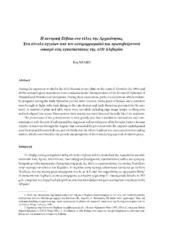| dc.description.abstract | During the expansion works for the ΔΕΗ thermal power plant on the coast of Aliveri in the 1990s and 2000s, archaeological excavations were conducted under the supervision of the former ΙΑ’ Ephorate of Classical and Prehistorical Antiquities. During these excavations, parts of a settlement, which evidently prospered during the Early Byzantine period, were revealed. Baths, parts of houses and a cemetery were brought to light, with finds dating to the Late Roman and Early Βyzantine periods (4th-7th century). A number of plain and table wares were recorded, including jugs, mugs, lamps, cooking pots and red-slipped fine wares. These pottery finds mainly represent facets of the daily life of the residents. The provenance of the pottery seems to vary greatly, and thus it testifies to interactions and communication with the rest of Euboea and the Aegean as well as with parts of the broader Eastern Roman Empire. A sea route through the Aegean that connected the provinces with the empire’s capital passed near Central and Eastern Euboea, and it is likely that the Aliveri harbour was used as an interim trading station, which contributed to the growth and prosperity of the town during a period of relative peace. | nob |
